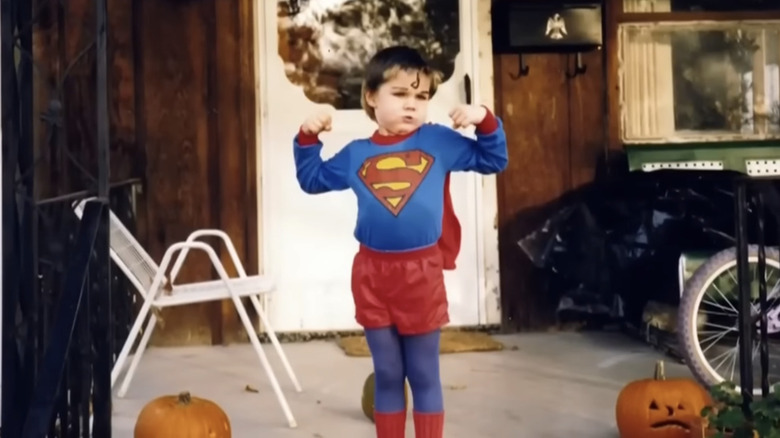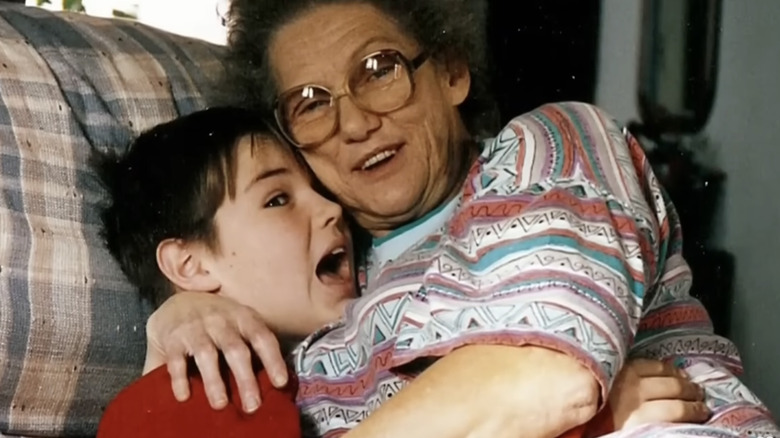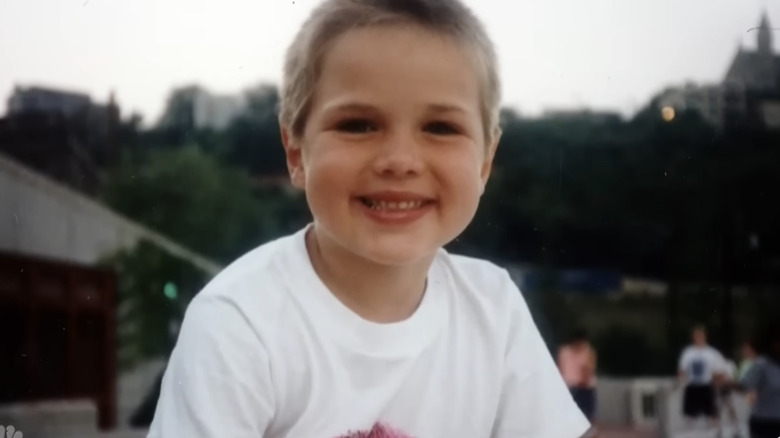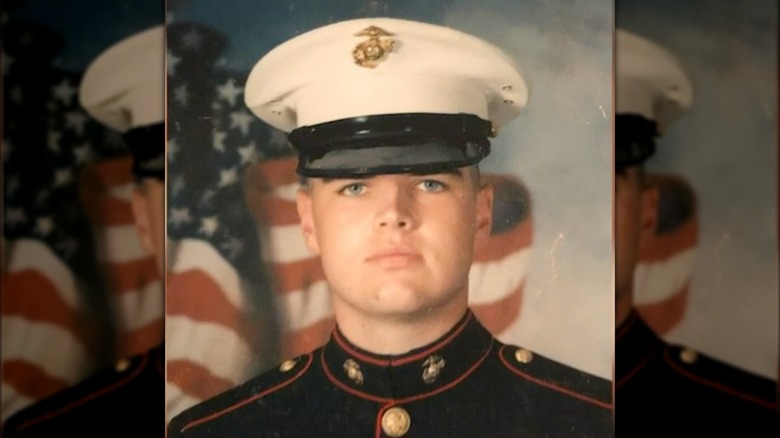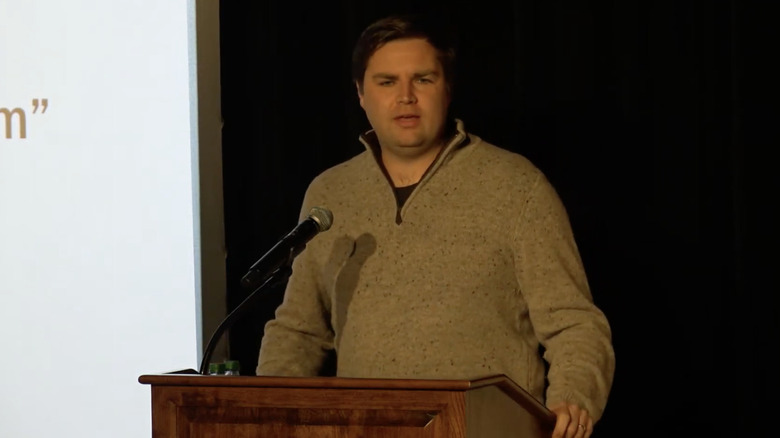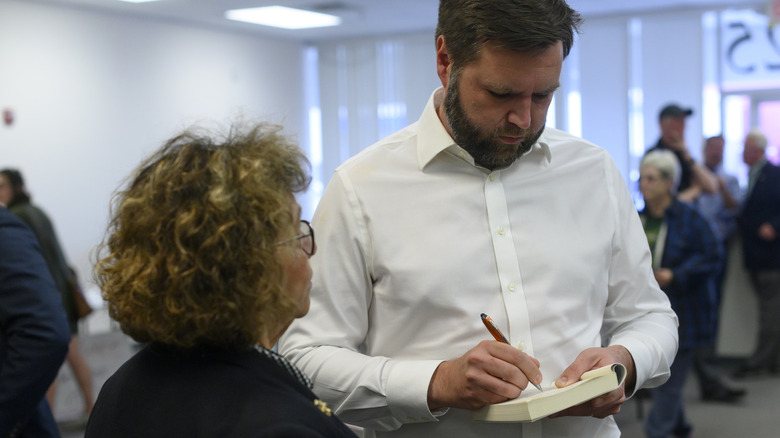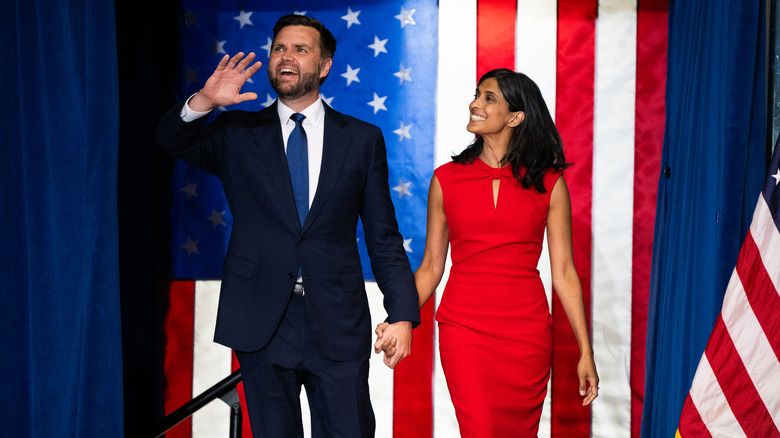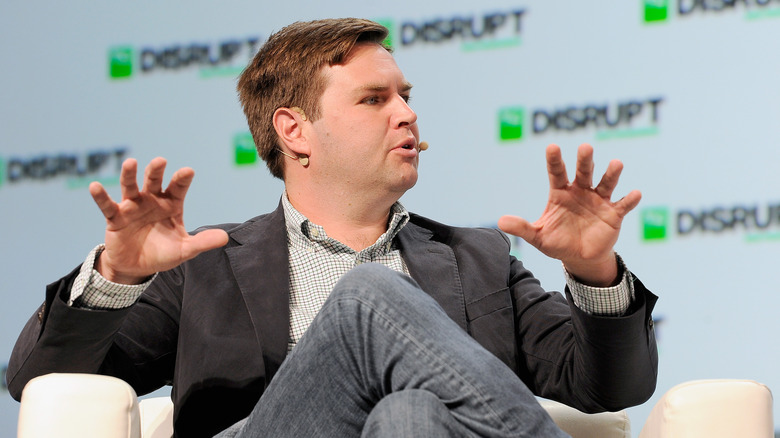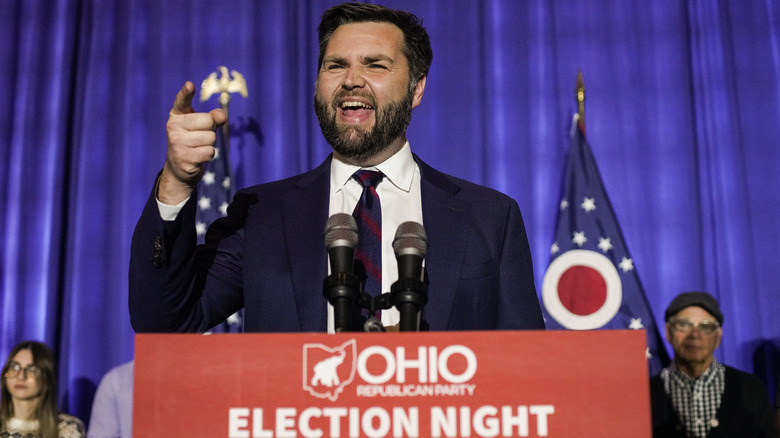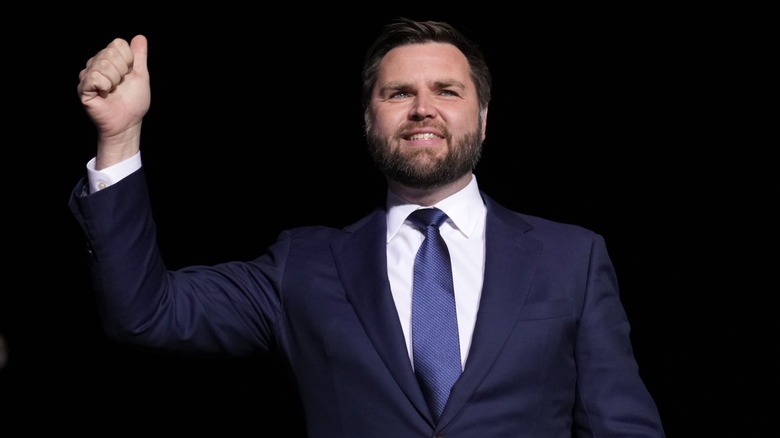JD Vance's Full Transformation From Appalachian Teen To 'Weird' Politician
There are numerous strange things about JD Vance we can't ignore, top of which is just how many transformations he's undergone in his lifetime. While folks may like talking about Vance's alleged eyeliner and his weird haircut, there are plenty more shocking things in this politician's closet. From the policy he spouts to his multiple careers, his faith, and even his name, Vance has undergone a complete transformation from Appalachian teen to "weird" politician.
Vance has built a persona around his conservative values, but his beliefs haven't always been as strict. Vance documented his harsh childhood in Middletown, Ohio in his 2016 memoir, "Hillbilly Elegy," which helped catapult him into the spotlight, but even those stories from his memoir have been called into question.
There are many opinion pieces out there that try to discredit the book, like the Los Angeles Times' column, "I know what a true hillbilly is, and it's not J.D. Vance," and The Guardian's "I'm from Appalachia. JD Vance doesn't represent us." So who is the real JD Vance? That's not always easy to tell. Here's a look at his transformation through the years.
JD Vance had a difficult childhood full of changes
JD Vance was born James Donald Bowman on August 2, 1984, to parents Beverly Aikins and Donald Bowman. His childhood proved difficult, and included several different father figures, an adoption, and even a name change.
When Vance was a toddler, his biological father left the family and, at 6, he was adopted by his mother's third husband, Bob Hamel. At the same time, his namesake was sponged away from his identity when he was rechristened James David Hamel. Unfortunately, Bob Hamel would eventually leave, too. "Of all the things I hated about my childhood, nothing compared to the revolving door of father figures," Vance wrote in his 2016 memoir, "Hillbilly Elegy," per Newsweek.
Even tougher was his strained relationship with his mother. While working as a nurse, Beverly battled addiction, first to prescription medication and eventually to heroin. Vance (who claims he was physically and verbally abused by his parents) was ultimately placed in the care of his grandparents, James and Bonnie Vance, when he was 12. To this day, he adoringly refers to them as Papaw and Mamaw, and it was the latter who became the maternal figure Vance needed. "She really just got me," he told Megyn Kelly in 2017. "She knew when I needed love and comfort." Their connection meant so much that Vance ultimately changed his name again in 2007 to honor his grandmother, officially becoming JD Vance once he left the Marines.
His mom threatened to kill them both when he was 12
JD Vance has been incredibly candid about his difficult relationship with his mother. As he told NPR in 2016, "Violence and chaos were an ever present part of the world that I grew up in." Perhaps nothing shaped his young life more than Beverly Aikins' arrest when he was just 12 years old.
As Vance recalled, the pair were driving on what was supposed to be a fun mother-son day out, but "something ignited her temper." Soon, Aikins began speeding and threatening her son. "She just kept on saying, I'm going to crash this car and kill us both," he shared. Vance says he jumped into the backseat to hide, which made matters worse, as his mother pulled over. "I think [she] was going to start hitting me," Vance told NPR, which in turn persuaded him to start running to find the closest house. Police were eventually called, and Aikins was charged with domestic violence.
The harrowing ordeal took a toll on young Vance. "In that moment, I just felt relieved and I thought to myself, 'Alright, I'm going to live another day,'" he told Megyn Kelly in 2017. But the drama was far from over. As child welfare services became involved, the tween knew there was a big probability he'd be placed into foster care — so he lied. At his mother's hearing, he told the judge nothing bad had happened in order to ensure he could move into his grandmother's house, where he was already spending much of his time.
JD started hanging with the wrong crowd – until his grandma stepped in
Bonnie "Mamaw" Vance may have showered her grandson with all of the love and attention he so desperately needed, but she was no pushover. Speaking with NPR in 2016, JD Vance admitted how, despite watching his mother struggle with addiction, he himself was drawn to drugs at a young age.
As he explained, he saw drugs as an escape from a rough home life. "By the time I was 13 or 14, I was hanging out with kids who were doing drugs," he told the outlet. "And I was even starting to experiment myself."
Luckily for him, Bonnie was exceptionally in tune with her grandson's extracurricular activities. "She recognized that I was starting to do these things and that they were becoming a problem, I think, much earlier than a lot of kids' parents would have," he praised. Not only that, but she also had the perfect solution. Speaking sternly with JD, she gave him an ultimatum: "You can either stop hanging out with these kids, or I'll run them over with my car."
Never one to doubt his Mamaw, JD took her at face value and quickly cut ties with the troublesome clique.
He joined the military after high school
After graduating from Ohio's Middletown High School in 2003, JD Vance began his career in the military. He enlisted in the Marine Corps, quickly rising to corporal in the Marine Corps Public Affairs Division (or DIVPA). Vance served as a combat correspondent for four years, spending six months deployed in Iraq.
As Vance explained in "Hillbilly Elegy," he would often photograph and write profiles on marines from different units, but he also served at times as an escort for civilian press. What's more, he occasionally took part in community outreach. "Civil affairs missions were typically considered more dangerous, as a small number of marines would venture into unprotected Iraqi territory to meet with locals," he wrote, per Military.com. Vance spent the rest of his service stateside and for the final nine months was appointed media relations officer for Cherry Point, a military air base that is highly regarded as an exceptional jet base.
He ultimately retired in 2007 with a number of awards to his name (including the Marine Corps Good Conduct Medal) and a whole new perspective on life. "When I joined the Marine Corps, I did so in part because I wasn't ready for adulthood," Vance wrote in his memoir, per Military.com. "The experience taught me a valuable lesson: that I could do it."
JD Vance decided to pursue a different career at Yale Law School
JD Vance had a very quick turnover between his military service and the start of his course load at Ohio State University, where he received a bachelor's degree in political science and philosophy in 2009. Soon after, Vance was accepted into Yale Law School in 2010. While he excelled at his studies and received his Juris Doctor (or JD) degree in 2013, the road to graduation was anything but easy.
As Vance wrote in "Hillbilly Elegy" (via The New York Times), "Yale Law, with its prestige and privilege, was a culture shock unlike anything I had ever experienced." Indeed, it was a different world than he was used to, and every aspect felt foreign. "I often worried ... whether I was making a fool of myself, or using a butter knife in the right way, or pronouncing 'sauvignon blanc' in the right way," he told The New York Times in 2016.
Even so, he was a bright light. As a student, he clerked for the Office of US District Court Judge David Bunning, as well as for Senator John Cornyn, who later told Fox Business in 2024, "He is [a hard worker] — smart guy, incredibly well-spoken." Following graduation, Vance landed a job as a corporate lawyer for Sidley Austin LLP, a massive multinational law firm, in 2014. However, he ultimately spent less than two years practicing law.
His life story became a hit book – and film
If it weren't for Yale Law School, JD Vance may never have written his best-selling book, "Hillbilly Elegy." The memoir debuted at No. 9 on The New York Times' hardcover nonfiction list in 2016, and was such a success that Ron Howard turned it into an Oscar-nominated film for Netflix in 2020. And yet, the project only came to fruition because of one fateful encounter on campus.
In his first year at Yale, Vance took a contracts class taught by Professor Amy Chua. Coincidentally, she had just published her own book, "Battle Hymn of the Tiger Mother," which Vance decided to read. As he later told The New York Times, he thought she'd be the perfect person to read a 20-page story he'd written about his childhood, so he emailed it to her. Her response? "You have a book in you."
Vance agreed and enrolled in another one of her classes (this one an international business transactions course), during which time those 20 pages turned into 60. The new iteration blended his personal story with a large dose of politics, and Professor Chua stepped in again, telling him he needed to stick with the memoir focus. Vance spent the next year refining the manuscript until it reached a point where Professor Chua decided it was time to introduce Vance to her literary agent.
Inside his love story with Usha Vance
It's no understatement that Yale Law School changed JD Vance forever. It shifted his perspective on life, pushed him to write his memoir, and introduced him to his future wife.
In 2013, Vance started dating fellow student Usha Chilukuri, and the pair seemed at first like opposites. The child of Indian immigrants, she was born and raised in San Diego, California, and was even a registered Democrat (although she later clerked for conservative justices Brett Kavanaugh and John Roberts). However, peers told The New York Times that they were the perfect fit because they were both ambitious go-getters. What's more, Chilukuri took over Mamaw Vance's role as Vance's inspiration. "Usha was like my Yale spirit guide," he wrote in "Hillbilly Elegy," per the outlet. "She instinctively understood the questions I didn't even know to ask and she always encouraged me to seek opportunities that I didn't know existed."
JD and Usha Vance married in 2014 in Kentucky, and soon welcomed three children: Ewan in 2017, Vivek in 2020, and Mirabel in 2021. Then, when Vance was chosen as Donald Trump's running made in 2024, putting him in the race for Vice President, she was right by his side — even though it wasn't easy. Some conservatives attacked Usha, focusing on her heritage and the fact that she's a practicing Hindu. Vance wasn't having it, saying on ABC News, "Don't attack my wife — she's out of your league."
He dabbled in venture investing
It took a while for JD Vance to find his calling in politics. After spending less than two years working in law, he decided to try his hand at being a venture capitalist. Vance moved to Silicon Valley and started his new career at Mithril Capital, a company co-founded by PayPal's Peter Thiel. Vance had actually met Thiel while studying at Yale Law School, and decided he'd be the perfect person to help him switch careers. Ultimately, though, Vance only spent two years working for Thiel. In 2017, Vance jumped again, joining Revolution LLC, a D.C.-based investment firm co-founded by AOL's Steve Case.
Two years after that, Vance co-founded his own company, Narya Capital, in Cincinnati, Ohio. According to its site, Narya is "an early-stage venture capital firm focused on using technology and science to solve for the future." Vance's focus was on helping local Ohio businesses, but he didn't get very far, as he shifted his focus to politics in 2021. He ran for the U.S. Senate seat being vacated by Rob Portman (R-Ohio), and won in 2022, which forced him to step down from Narya Capital. As Axios notes, it's difficult to say whether Vance was a good venture capitalist or not simply because he didn't spend enough time in the industry to actually prove himself either way.
JD entered politics in his late thirties
Timing is everything. When JD Vance chose to enter the political arena in July 2021, he was throwing his hat into what Politico dubbed a "chaotic Ohio Senate primary." Indeed, there was a wide range of candidates with no clear favorites — and this ended up playing to Vance's advantage.
While it was his first time running for office, Vance had many supporters with deep pockets, including his former boss, Peter Thiel, who gave $10 million to help his campaign. He also eventually received then-President Donald Trump's endorsement. Ultimately, Vance was elected as the new United States Senator for Ohio, and was sworn into office on January 3, 2023.
Vance, who was 38 at the time, told supporters in his victory speech, per AP, that while they may not always agree with his decisions, he would also work for their state's betterment. "I will never forget the woman who raised me, I will never forget where I came from and I will never forget the great people of Ohio," he announced.
He converted from atheism to Catholicism in his 30s
JD Vance has gone through many shifts in his life, but one of the most surprising may just be his religious beliefs. As a child, he was first introduced to the idea of religion by his Pentecostal father. Then he moved in with his grandmother and, as he once told supporters, per NPR, "She was a woman of very deep Christian faith." And yet, he wasn't particularly swayed in either direction. Indeed, by the time he left the Marine Corps in 2007, Vance identified himself as an atheist.
It wasn't until 2011, when he attended a talk given by venture capitalist Peter Thiel at Yale, that Vance's interest was piqued. "[Thiel] was possibly the smartest person I'd ever met, but he was also a Christian," Vance wrote in a 2020 essay for The Lamp Magazine. Soon, he was reflecting on religion and his relationship to it, even undertaking what he called "a more serious period of study" with a Dominican friar.
In 2019, Vance was baptized, received his first Communion, and joined the Catholic church. Speaking of the attraction, he told The Napa Institute in 2023, "I really liked that the Catholic Church was just really old ... it had stood really strong on some of the core moral issues." Since then, he's become unwavering in his beliefs, standing against abortion, divorce, LGBTQ rights, and more.
He went from bashing Trump to becoming Trump's VP pick
Donald Trump is used to critics, but it's not always that he befriends them. During his 2016 presidential campaign, JD Vance was one of many who spoke critically of Donald Trump. At the time, Vance had yet to enter politics himself, but he wasn't shy about sharing his opinion, proudly telling Charlie Rose, "I'm a Never Trump guy; I never liked him." That same year, he sent a since-deleted tweet proclaiming about Trump, per Politico, "My god what an idiot," and wrote an op-ed for The New York Times in which he argued, "Mr. Trump is unfit for our nation's highest office." According to his former Yale roommate, Josh McLaurin, he also allegedly called Trump "America's Hitler."
However, that all magically changed after the pair first met in 2021 during Vance's run for the Ohio Senate. Trump went on to endorse Vance, and, in 2024, Vance became Trump's official VP pick. Explaining the huge shift, Vance told The New York Times in 2024, "I allowed myself to focus so much on the stylistic element of Trump that I completely ignored the way in which he substantively was offering something very different on foreign policy, on trade, on immigration." He also revealed that he voted for Trump in 2020.
Why was he called 'weird' in the first place?
The 2024 presidential race was marked by numerous shocking moments, including Joe Biden dropping out and a surprise Kamala Harris-Tim Walz ticket on the Democratic side. As the pair began squaring off against Donald Trump and JD Vance, Walz coined a new line of attack focused on how "weird" their opponents are, especially Vance.
It all started in July, 2024, when Walz (who had yet to be named as Harris' VP pick), told the hosts at "Morning Joe," "These guys are just weird!" That same day, Walz also appeared on MSNBC and posted a clip of the interview to X, formerly known as Twitter, that quickly went viral as he proclaimed, "These are weird people on the other side." Democrats latched onto the word wholeheartedly, tweeting memes and using it to caption campaign videos of Vance. "It perfectly describes the uneasiness people feel," Tim Hogan, a Democratic strategist, told Politico of its appeal. "It's how you might talk to your neighbor about the crazy political climate we're living in."
Well, Vance wasn't impressed. "They're name-calling instead of actually telling the American people how they're going to make their lives better," he clapped back on CNN. "I think that's weird ... but look, they can call me whatever they want to."


